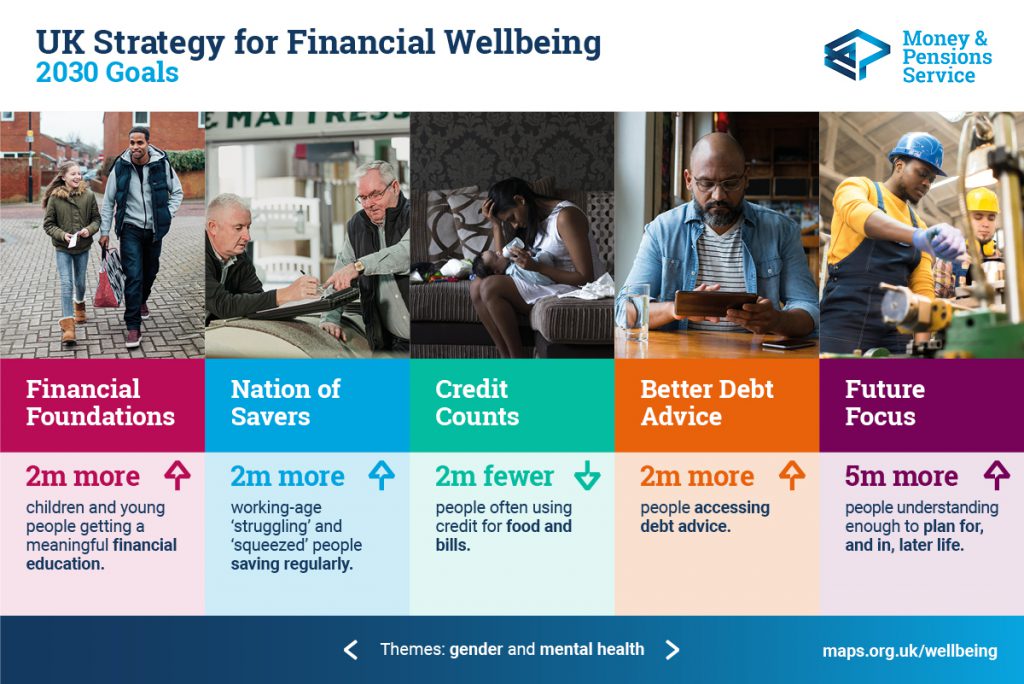UK Strategy for Financial Wellbeing sets out ten-year vision to improve millions of lives
Five priority areas to help people make the most of their money and pensions
A new UK-wide strategy to transform the country’s financial wellbeing in a decade is being launched today by the Money and Pensions Service (MaPS) under its government mandate. Delivering on the strategy will transform the lives of many individuals, benefitting communities, businesses, the economy and wider society.

The UK Strategy for Financial Wellbeing establishes five “agendas for change” and sets goals to be achieved by 2030. These are:
- Financial Foundations: 6.8 million children and young people getting a meaningful financial education – an increase of 2 million from 20191
- Nation of Savers: 16.7 million working age people who are struggling2 and squeezed3 saving regularly – an increase of 2 million
- Credit Counts: 2 million fewer people often using credit to pay for food or bills
- Better Debt Advice: 2 million more people getting the debt advice they need; currently only 32% of those who need debt advice access it
- Future Focus: 28.6 million people understanding enough to plan for their later lives, and during them – an increase of 5 million.
The strategy will also examine factors which can make people particularly susceptible to financial detriment, such as mental health conditions and gender. It will be delivered in collaboration with a broad range of organisations and experts from all sectors.
What is financial wellbeing?
Financial wellbeing is about feeling secure and in control. It is knowing that you can pay the bills today, can deal with the unexpected tomorrow and are on track for a healthy financial future. People should feel confident and empowered.
Why is a UK strategy needed?
Poor financial wellbeing has knock-on effects for our mental health, physical health and relationships. We know that:
- 11.5 million people have less than £100 in savings to fall back on
- 9 million people often use credit to pay for food or essential bills
- 22 million people say they don’t know enough to plan for their retirement
- 5.3 million children aren’t getting a meaningful financial education.
People who enjoy good financial wellbeing are more productive at work, and businesses also benefit from having customers who can afford to keep up with bills and payments. Individuals and the wider economy benefit from people being able to invest money for retirement.
“A decade to make a difference”
Caroline Siarkiewicz, Acting Chief Executive of the Money and Pensions Service said:
“Financial wellbeing underpins personal health and happiness but it doesn’t happen by chance. We’re launching a strategy for entire lifetimes, aiming to expand financial education for children while ensuring everyone is equipped to plan for and enjoy their retirement. Key initiatives include increasing the availability of affordable credit, more payroll savings products and an expansion of free debt advice for when people are in crisis.
“The Money and Pensions Service will be the catalyst for a financial wellbeing movement, transforming how people engage with their money and pensions. We have a decade to make a difference and we cannot achieve change alone, so we will be connecting companies, charities and other organisations which share our vision, to make this happen.”
Sir Hector Sants, Chair of the Money and Pensions Service said:
“The UK Strategy sets out our ambition to transform financial wellbeing over the next decade.
“The importance of financial wellbeing is under-appreciated. It is not only about financial capability but also feeling secure, in control, confident and empowered in relation to money. It is central to personal wellbeing and thus to living a contented life.
“The UK Strategy for Financial Wellbeing will only be successful for individuals if it is supported by the right products, regulation, services and corporate culture. Achieving the strategy will thus require the support and, in many cases, action by both the private and the public sector.”
Guy Opperman, Minister for Pensions and Financial Inclusion, said:
“The Government wants to make it easy for those who need it most to get help to make confident financial choices. The one-stop-shop Money and Pensions Service’s free, high-quality, impartial information and guidance delivers exactly that.
“Also, it has an important part to play in helping today’s young people become tomorrow’s savvy savers, and the development of groundbreaking digital pensions dashboards which will transform how all of us plan for retirement.”
What next?
Over the first half of 2020, MaPS will work with leaders and experts from across the public, private and voluntary sectors to set out clear delivery plans to achieve the five goals, with specific plans for England, Scotland, Wales and Northern Ireland.
Following this mobilisation phase, MaPS will develop its own corporate strategy which will define how the organisation will activate the UK Strategy and continue to deliver on essential money and pensions guidance and services to its customers.
Further information is available at maps.org.uk/wellbeing
-ENDS-
For media enquiries contact:
MaPS Press Office 020 8132 5284 / media@maps.org.uk
Sarah Cordey, senior communications manager 020 8132 5251 / sarah.cordey@maps.org.uk
Mia Cochrane, senior press officer 020 8132 4937 / mia.cochrane@maps.org.uk
Ben Infield, press officer 020 8132 4696 / benjamin.infield@maps.org.uk
Notes to editors
1. 2018 Financial Capability Survey, Money and Pensions Service
2. MaPS defines those who are ‘struggling’ as people who find it hard to keep up with bills and payments and to build any form of savings buffer. They are the least financially resilient segment and the most likely to be over-indebted.
3. Those who are ‘squeezed’ are working-age consumers with significant financial commitments but relatively little provision for coping with income shocks. They are digitally savvy and have high media consumption, but this is more for entertainment than financial information.
This is based on the Money Advice Service Target Market Segmentation.
4. 2018 Financial Capability Survey, Money and Pensions Service
5. 2019 Debt Need Survey (forthcoming), Money and Pensions Service
Background to the Strategy
Before developing the UK Strategy, MaPS conducted robust research and a review of existing evidence about financial wellbeing, building on the work and findings of the Financial Capability Strategy for the UK published by the Money Advice Service in 2015.
The organisation listened to the views of more than 1,000 leaders and frontline specialists in cities across the UK, received written submissions from 39 expert organisations, and drew in the expertise and views of the staff and volunteers from MaPS’ predecessor organisations (The Money Advice Service, The Pensions Advisory Service and Pension Wise).
Organisations interested in moving the dials on financial wellbeing are encouraged to review the strategy, consider how their work could support the agendas for change, and contact strategy@maps.org.uk highlighting where they could help to turn these goals into reality.
About the Money and Pensions Service
The Money and Pensions Service (MaPS) vision is: ‘everyone making the most of their money and pensions.’
MaPs is an arm’s-length body sponsored by the Department for Work and Pensions (DWP), and it has a joint commitment to provide access to the information and guidance people across the UK need, to make effective financial decisions over their lifetime. The organisation also engages with HM Treasury on policy matters relating to financial capability and debt advice.
As the largest single funder of free debt advice in England MaPS works alongside partners across the UK to make debt advice easier and quicker to access when and where people need it, and to improve standards and quality across the sector.
For further information visit the Money and Pensions Service website www.moneyandpensionsservice.org.uk
Consumers can access free guidance about their money and pensions via the following websites and help lines:
For money guidance: www.moneyadviceservice.org.uk / 0800 138 7777 / We are also piloting a WhatsApp service available on +44 7701 342744
For general pensions guidance: www.pensionsadvisoryservice.org.uk / 0800 011 3797
For pensions guidance for those aged 50 and over: www.pensionwise.gov.uk/en/ 0800 138 3944
